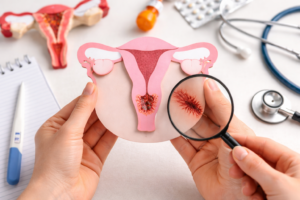Overview
Discover the causes, symptoms, and management of premature menopause. Expert insights from Ova Care to support your health journey.
What is Premature Menopause?
At Ova Care, we understand that premature menopause can be a challenging and complex experience for many women. Unlike typical menopause, which occurs around age 51, premature menopause happens before age 40, affecting approximately 1% of women worldwide.
Defining the Terms
Premature menopause isn’t just an early biological transition—it’s a significant health event that can impact a woman’s physical and emotional well-being. Unlike primary ovarian insufficiency (POI), premature menopause means a complete cessation of ovarian function, permanently ending menstruation and fertility.
Key Causes of Premature Menopause
Multiple factors can trigger premature menopause, including:
- Chromosomal abnormalities like Fragile X or Turner’s syndrome
- Autoimmune conditions such as rheumatoid arthritis and thyroid disease
- Medical treatments like chemotherapy or radiation
- Surgical procedures including hysterectomy
- Certain viral infections like mumps
- Chronic conditions like Myalgic encephalomyelitis/chronic fatigue syndrome
Interestingly, up to 50% of cases have no identifiable cause, highlighting the complexity of this condition.
Recognizing the Symptoms
Women experiencing premature menopause might notice:
- Night sweats disrupting sleep patterns
- Vaginal dryness causing discomfort
- Increased urinary tract infections
- Persistent insomnia
- Emotional fluctuations and mood changes
Potential sexual dysfunction
Health Implications
Premature menopause isn’t just about reproductive changes. It significantly increases risks for:
- Osteoporosis
- Heart disease
- Neurological conditions like dementia and Parkinson’s disease
- Potential mental health challenges
Treatment and Management
At Ova Care, we recommend a comprehensive approach:
Hormone Replacement Therapy (HRT)
Hormone therapy can be crucial in managing symptoms and mitigating long-term health risks. Our specialists work closely with patients to develop personalized treatment plans.
Fertility Options
While premature menopause affects fertility, options like in vitro fertilization using donor eggs or previously frozen eggs remain possible. Our fertility experts can guide you through these complex decisions.
When to Seek Professional Help
If you’re experiencing irregular periods before age 40 or persistent menopausal symptoms, it’s essential to consult a healthcare professional.
Your Partner in Women’s Health
At www.theovacare.com, we’re committed to supporting women through every stage of their health journey. Premature menopause might feel overwhelming, but you’re not alone.
Schedule a consultation today to understand your options and receive compassionate, expert care.
Disclaimer: This blog is for informational purposes and should not replace professional medical advice.










 No need to worry, your data is 100% Safe with us!
No need to worry, your data is 100% Safe with us!